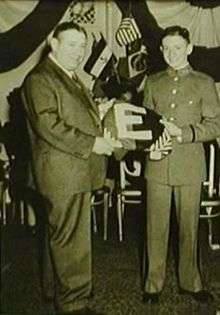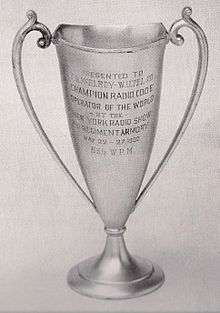Theodore Roosevelt McElroy
Theodore Roosevelt McElroy (September 15, 1901 – November 12, 1963) was an American telegraph operator and a radio telegrapher FCC amateur with call sign W1JYN. He holds the all-time speed record for receiving Morse code.

Early life
McElroy was born September 15, 1901 (baptism 1903)[1] in Somerville, Massachusetts.[2] He was named after Theodore Roosevelt, the "cowboy president", whom his parents admired. Roosevelt had succeeded to the presidency upon the death of President William McKinley, the day before McElroy's birth.[1] He went by the name Teddy, Ted, T.R., or Mac as he disliked his birth name.[1] He was the third of six children from a family with an Irish background.[3]
Mid life
McElroy began his career at Western Union as messenger when he was fourteen years old.[4] He graduated from Forster Grammar School in Somerville, Massachusetts, in 1916. In that same year he enrolled in the Commercial Course at Somerville High School.[5] He became a telegraph operator at the age of fifteen[6] and received his commercial radio operator's license at the age of nineteen.[5]
Family
McElroy married Margaret Coleman of South Boston on October 26, 1925. Their son John C. McElroy was born on November 11, 1926.[5]
Career
McElroy went into the manufacturing business when he was 33 years old and eventually formed McElroy Manufacturing Corporation in 1941.[7] He made straight telegraph keys and semi-automatic keys under the trade name of "Mac-Key." He had a couple of dozen variations of his telegraph keys. McElroy also made electronic code practice oscillators and inked tape keyers.[8]
McElroy made telegraph keying equipment for US military personnel during World War II. He manufactured straight telegraph hand keys and semi-automatic keys for the public and the military in the mid 1940s.[9] The Allied Electronics 1940s catalogs showed a variety of his telegraph keys. He amassed a fortune with this equipment that earned him millions of dollars. When his military telegraph equipment was no longer needed after the war he mismanaged his money and spent most of it.[8]

Contests
McElroy won contests for receiving speed code and setting records when he was 21 years old.[10] He was the first radio receiver to record a speed of more than 50 words per minute.[11] For his accomplishments McElroy was awarded a silver cup that was inscribed "Presented to the Champion Radio Code Operator of the World."[12]
McElroy showed a demonstration of receiving 77 words per minute in 1935. He received a letter by the Cape Cod Radio Club attesting to this fact. The Club initially checked his speed with the 18-dot standard and recorded his speed at 90 words per minute. When the 21-dot standard is applied then his speed is computed to be 77 words per minute (18/21 times 90 wpm = 77 wpm). McElroy showed a speed of 75 words per minute in the Boston "World of Tomorrow" exhibition on 16 November 1938, although it is not counted as an official contest. He demonstrated a copy speed of 75.2 words per minute on 2 July 1939 at the Radio Club in Asheville, North Carolina.[8][13][14]
McElroy was named to Philadelphia's Morse Telegraph Hall of Fame in 1964.[5]
Retirement and death
McElroy relocated his business to Littleton, Massachusetts around 1950 and in 1955 he sold it to Telegraph Apparatus Company ("T.A.C.") of Chicago. He worked for a few years at T.A.C. and other companies that built electronic equipment, then eventually retired. He gave code demonstrations in retirement and became interested in politics. McElroy died in November 1963.[8]
Legacy
McElroy donated funds for the radio communication instruments for the expedition of the 1947 Ronne Antarctic Research Expedition. Because of that a mountain peak in Antarctica was named for him, Mount McElroy. It is located inland from the coast just south of latitude −74°.[15]
References
- French 1993, p. 3.
- "Massachusetts Births, 1841–1915, database with images (Charles Mcelroy in entry for Theodore Roosevelt Mcelroy, 15 Sep 1901; citing Somerville, Middlesex, Massachusetts, reference cn1093, Massachusetts Archives, Boston; FHL microfilm 2,057,386)". familysearch.org. Retrieved 20 September 2015.
- "Entrepreneurial Family History". JackMcElroy.com. 2015. Retrieved September 20, 2015.
- French 1993, p. 4.
- French 1993, p. 129.
- French 1993, p. 5.
- French 1993, p. 55.
- "History of the radio manufacturer McElroy, T.R.; Boston MA". 2015. Retrieved September 20, 2015.
He set the all-time, still-unbroken official record of 75.2 words per minute in 1939
- French 1993, pp. 58–66.
- French 1993, p. 6.
- Kane 1997, p. 454.
- French 1993, p. 12.
- French 1993, p. 131.
- Coe 2003, p. 168.
- French 1993, p. 75.
Sources
- Coe, Lewis (1 January 2003). The Telegraph: A History of Morse's Invention and Its Predecessors in the United States. McFarland. ISBN 978-0-7864-1808-4.CS1 maint: ref=harv (link)
- French, Tom (1993). McElroy, World's Champion Radio Telegrapher. Artifax Books. ISBN 978-1-890024-03-1.CS1 maint: ref=harv (link)
- Kane, Joseph Nathan (1997). Famous First Facts, Fifth Edition. The H. W. Wilson Company. ISBN 0-8242-0930-3.
The first radio receiver to record a speed of more than 50 words per minute was Theodore R. McElroy, telegraph operator for the Boston Herald. On May 7, 1922, at the Boston Radio Show, he typed for three minutes at a speed of 51.5 words per minute without making a mistake. On May 24 he was a contestant at the New York Radio Show at the 71st Regiment Armory, where he typed perfectcopy for two minutes at 50.5 words per minute. He won a silver cup inscribed "Presented to the Champion Radio Code Operator of the World.
CS1 maint: ref=harv (link)